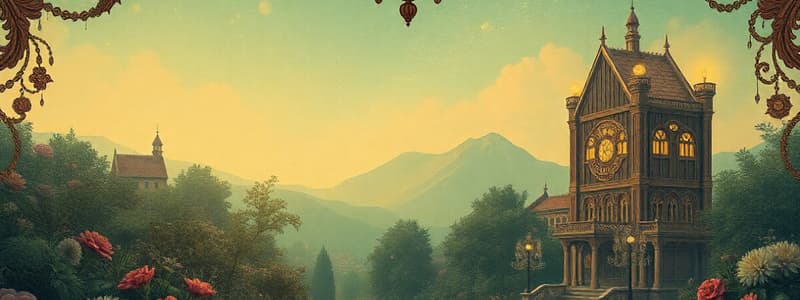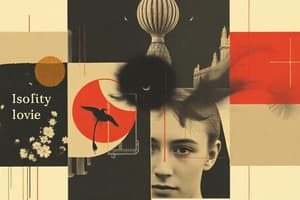Podcast
Questions and Answers
Which of the following is a key difference between a film score and a soundtrack?
Which of the following is a key difference between a film score and a soundtrack?
- A film score includes pre-existing songs, while a soundtrack is original.
- A film score is used to create a historical setting, while a soundtrack enhances action sequences.
- A film score is released as an album, while a soundtrack is not.
- A film score is always instrumental, while a soundtrack can include lyrics. (correct)
Leitmotifs are musical themes associated with particular characters, places, or emotions and are commonly used in film scores.
Leitmotifs are musical themes associated with particular characters, places, or emotions and are commonly used in film scores.
True (A)
Name two ways in which music enhances storytelling in films.
Name two ways in which music enhances storytelling in films.
Establishing emotion, setting the mood and atmosphere
The composer meets with the __________ to understand the film's themes and emotions before composing the music.
The composer meets with the __________ to understand the film's themes and emotions before composing the music.
Match the type of movie score with its description:
Match the type of movie score with its description:
Which film uses jazz music to create a dreamy, nostalgic atmosphere?
Which film uses jazz music to create a dreamy, nostalgic atmosphere?
Film music, unlike pop music, usually remains the same in tone and intensity throughout the movie.
Film music, unlike pop music, usually remains the same in tone and intensity throughout the movie.
Give an example of a film where the soundtrack features popular songs to reflect the personality of a main character.
Give an example of a film where the soundtrack features popular songs to reflect the personality of a main character.
A recurring musical theme or melody associated with a character or idea is known as a _________.
A recurring musical theme or melody associated with a character or idea is known as a _________.
Which process is typically the last step in creating movie music?
Which process is typically the last step in creating movie music?
Flashcards
Movie Music
Movie Music
Musical elements added to films that enhance storytelling, influence emotions, and create an immersive experience.
Film Score
Film Score
Original, instrumental music composed specifically for a movie to support the mood, action, and themes.
Soundtrack
Soundtrack
All the music used in a movie including pre-existing songs, pop, rock, or classical pieces chosen to enhance storytelling.
Leitmotif
Leitmotif
Signup and view all the flashcards
Establishing Emotion (in Film)
Establishing Emotion (in Film)
Signup and view all the flashcards
Setting the Mood and Atmosphere
Setting the Mood and Atmosphere
Signup and view all the flashcards
Enhancing Action and Suspense
Enhancing Action and Suspense
Signup and view all the flashcards
Tied to Visuals
Tied to Visuals
Signup and view all the flashcards
Narrative Function
Narrative Function
Signup and view all the flashcards
Dynamic Changes
Dynamic Changes
Signup and view all the flashcards
Study Notes
- Movie music enhances storytelling, influences emotions, and creates an immersive experience.
Components of Movie Music
- Film Score
- Soundtrack
Film Score
- Original, instrumental music made for a movie.
- Supports the mood, action, and themes without lyrics.
Characteristics of a Film Score
- Usually written for an orchestra, or include electronic or solo instruments.
- Themes change with the story's progression.
- Composers use "leitmotifs"—musical themes for characters, places, or emotions.
- John Williams' Star Wars theme creates adventure and heroism.
- Hans Zimmer's Interstellar score uses a church organ to create vastness and time distortion.
Soundtrack
- All music used in a movie, including pre-existing songs in different genres.
- Not necessarily written for the film but chosen to enhance the storytelling.
Characteristics of a Soundtrack
- Can be composed of popular songs, jazz, folk music, or other styles.
- Often defines a film's cultural or historical setting.
- Sometimes released as an album for listening.
- Guardians of the Galaxy (2014) soundtrack features 1970s/1980s pop hits.
- Titanic (1997) – “My Heart Will Go On" is one of the most famous movie songs of all time.
Why is Music Used in Movies?
- Plays a crucial role in films
Establishing Emotion
- Helps create and intensify emotions, making scenes more impactful.
- Scenes would feel flat or lifeless without it.
- John Williams' violin theme in Schindler's List (1993) enhances the film's heartbreaking tone.
- Michael Giacchino's score in Up (2009) evokes deep emotions about love and loss.
Setting the Mood and Atmosphere
- Helps establish whether a scene is happy, sad, suspenseful, or romantic.
- Horror films such as Psycho (1960) use high-pitched violin screeches to create tension and fear.
- La La Land (2016) uses jazz music to create a dreamy, nostalgic atmosphere.
Enhancing Action and Suspense
- Fast-paced music makes action sequences more exciting and intense.
- The Mission Impossible (1996) theme uses a fast rhythm and strong beats to emphasize the high-stakes action.
- The Dark Knight (2008) uses intense, electronic strings to build tension.
Identifying Characters and Themes
- A musical leitmotif (a recurring melody) is often used to represent a character or idea.
- Darth Vader's Imperial March from Star Wars signals danger.
- Hedwig's Theme from Harry Potter evokes magic and mystery.
Establishing Time and Place
- Music can transport audiences to different cultures, historical periods, or fantasy worlds.
- The Lion King (1994) uses African rhythms and choral singing to establish an African setting.
- The Great Gatsby (2013) mixes 1920s jazz with modern hip-hop to create an updated version of the Roaring Twenties.
How is Movie Music Created?
- Composition Process
Composition Process
- The composer meets with the director to understand the film's themes and emotions.
- Music is written based on the script and visuals.
- Themes and leitmotifs are developed for characters, places, and emotions.
- The score is recorded, often with a live orchestra or digital production.
- Hans Zimmer used deep, powerful drums for the Inception (2010) soundtrack to create a sense of urgency.
Types of Music Production
- Orchestral Scores: Performed by full orchestras (Lord of the Rings trilogy).
- Electronic Scores: Created using synthesizers (Tron: Legacy by Daft Punk).
- Hybrid Scores: Combine both elements (Mad Max: Fury Road).
What Makes Movie Music Different from Other Genres?
- Tied to Visuals: Film music follows the action on screen.
- Narrative Function: Enhances the story rather than just existing for enjoyment.
- Dynamic Changes: Movie scores shift in tone and intensity depending on the scene. Music adapts to changing emotions.
Studying That Suits You
Use AI to generate personalized quizzes and flashcards to suit your learning preferences.




